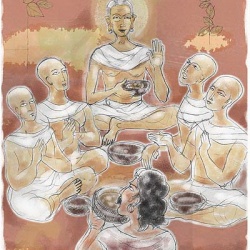Difference between revisions of "Apostasy"
| Line 1: | Line 1: | ||
[[File:Buddha_20.jpg|thumb|250px|]] | [[File:Buddha_20.jpg|thumb|250px|]] | ||
| − | The English term [[apostasy]] comes from the Latin apostata and means ‘to move away from,’ while the {{Wiki|Arabic}} term ''riddah'' means‘turning back.’ [[Apostasy]] is, therefore, to {{Wiki|renounce}} one’s [[religion]] and adopt another or no [[religion]]. [[Buddhism]] does not have a legalistic approach to [[belief]] and, thus, never developed a {{Wiki|concept}} of [[apostasy]], nor does any [[Buddhist]] {{Wiki|culture}} have such a {{Wiki|concept}}. In [[Buddhism]], the {{Wiki|individual}} is free to believe or not according to his or her inclinations and [[understanding]]. | + | The English term [[apostasy]] comes from the {{Wiki|Latin}} apostata and means ‘to move away from,’ while the {{Wiki|Arabic}} term ''riddah'' means‘turning back.’ [[Apostasy]] is, therefore, to {{Wiki|renounce}} one’s [[religion]] and adopt another or no [[religion]]. [[Buddhism]] does not have a legalistic approach to [[belief]] and, thus, never developed a {{Wiki|concept}} of [[apostasy]], nor does any [[Buddhist]] {{Wiki|culture}} have such a {{Wiki|concept}}. In [[Buddhism]], the {{Wiki|individual}} is free to believe or not according to his or her inclinations and [[understanding]]. |
| − | The [[Buddha’s]] [[attitude]] to [[apostasy]] is epitomised by his encounter with a man named Sunakkhatta. He was a [[disciple]] of the [[Buddha]], but after a while became dissatisfied with the [[Dhamma]] and decided to {{Wiki|renounce}} the [[Teacher]] and the [[teaching]]. Sunakkhatta came to the [[Buddha]] and said: ‘[[Lord]], I am leaving you. I am no longer living by your teachings.’ The [[Buddha]] responded to this declaration by asking Sunakkhatta some questions: ‘Did I ever say to you: “Come, [[live]] by my teachings?”’ ‘No [[Lord]].’ ‘Then did you ever say to me that you wished to [[live]] by my teachings?’ ‘No [[Lord]].’ ‘That [[being]] the case, who are you and what are you giving up, you [[foolish]] man?’ (D.III,2-3). Neither in this case nor others, did the [[Buddha]] suggest that apostates be punished nor did he say that apostates would go to [[hell]] simply because of their [[apostasy]]. None of the criminal {{Wiki|codes}} of [[traditional]] [[Buddhist]] countries criminalized [[apostasy]]. See [[Conversion]] and [[Tolerance]]. | + | The [[Buddha’s]] [[attitude]] to [[apostasy]] is epitomised by his encounter with a man named [[Sunakkhatta]]. He was a [[disciple]] of the [[Buddha]], but after a while became dissatisfied with the [[Dhamma]] and decided to {{Wiki|renounce}} the [[Teacher]] and the [[teaching]]. [[Sunakkhatta]] came to the [[Buddha]] and said: ‘[[Lord]], I am leaving you. I am no longer living by your teachings.’ The [[Buddha]] responded to this declaration by asking [[Sunakkhatta]] some questions: ‘Did I ever say to you: “Come, [[live]] by my teachings?”’ ‘No [[Lord]].’ ‘Then did you ever say to me that you wished to [[live]] by my teachings?’ ‘No [[Lord]].’ ‘That [[being]] the case, who are you and what are you giving up, you [[foolish]] man?’ (D.III,2-3). Neither in this case nor others, did the [[Buddha]] suggest that apostates be punished nor did he say that apostates would go to [[hell]] simply because of their [[apostasy]]. None of the criminal {{Wiki|codes}} of [[traditional]] [[Buddhist]] countries criminalized [[apostasy]]. See [[Conversion]] and [[Tolerance]]. |
{{R}} | {{R}} | ||
[http://www.buddhisma2z.com/content.php?id=24 www.buddhisma2z.com] | [http://www.buddhisma2z.com/content.php?id=24 www.buddhisma2z.com] | ||
[[Category:Theravada Buddhism]] | [[Category:Theravada Buddhism]] | ||
[[Category:Buddhist Terms]] | [[Category:Buddhist Terms]] | ||
Latest revision as of 06:01, 24 August 2014
The English term apostasy comes from the Latin apostata and means ‘to move away from,’ while the Arabic term riddah means‘turning back.’ Apostasy is, therefore, to renounce one’s religion and adopt another or no religion. Buddhism does not have a legalistic approach to belief and, thus, never developed a concept of apostasy, nor does any Buddhist culture have such a concept. In Buddhism, the individual is free to believe or not according to his or her inclinations and understanding. The Buddha’s attitude to apostasy is epitomised by his encounter with a man named Sunakkhatta. He was a disciple of the Buddha, but after a while became dissatisfied with the Dhamma and decided to renounce the Teacher and the teaching. Sunakkhatta came to the Buddha and said: ‘Lord, I am leaving you. I am no longer living by your teachings.’ The Buddha responded to this declaration by asking Sunakkhatta some questions: ‘Did I ever say to you: “Come, live by my teachings?”’ ‘No Lord.’ ‘Then did you ever say to me that you wished to live by my teachings?’ ‘No Lord.’ ‘That being the case, who are you and what are you giving up, you foolish man?’ (D.III,2-3). Neither in this case nor others, did the Buddha suggest that apostates be punished nor did he say that apostates would go to hell simply because of their apostasy. None of the criminal codes of traditional Buddhist countries criminalized apostasy. See Conversion and Tolerance.
